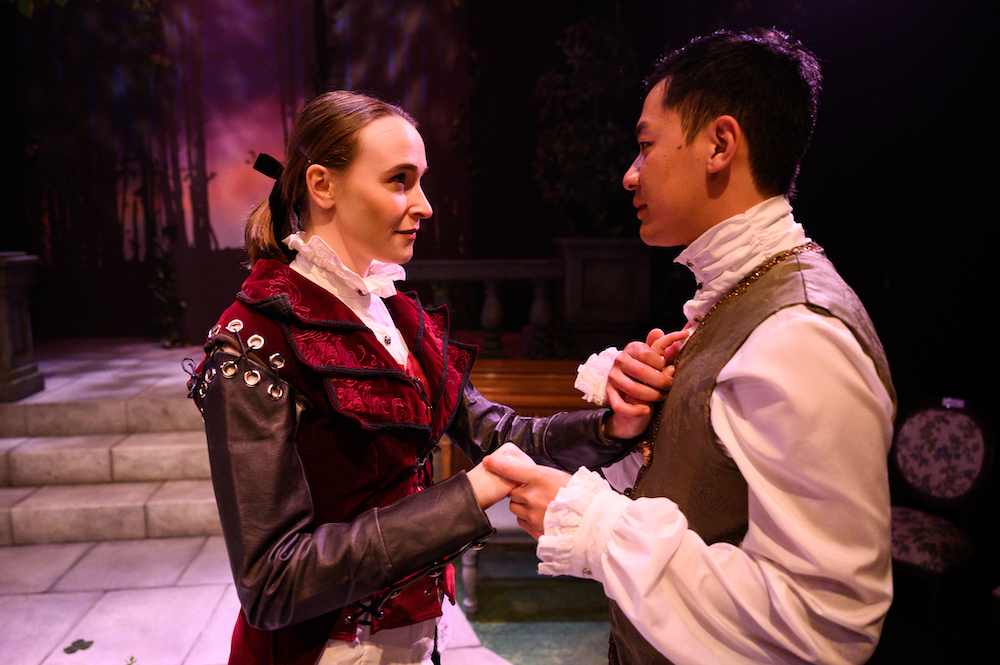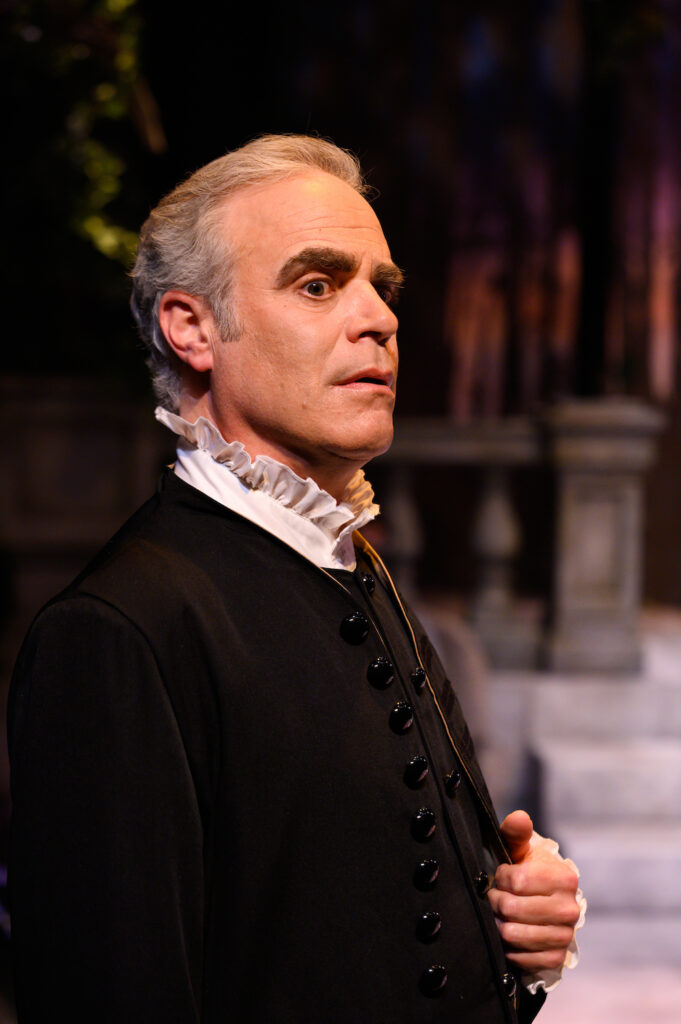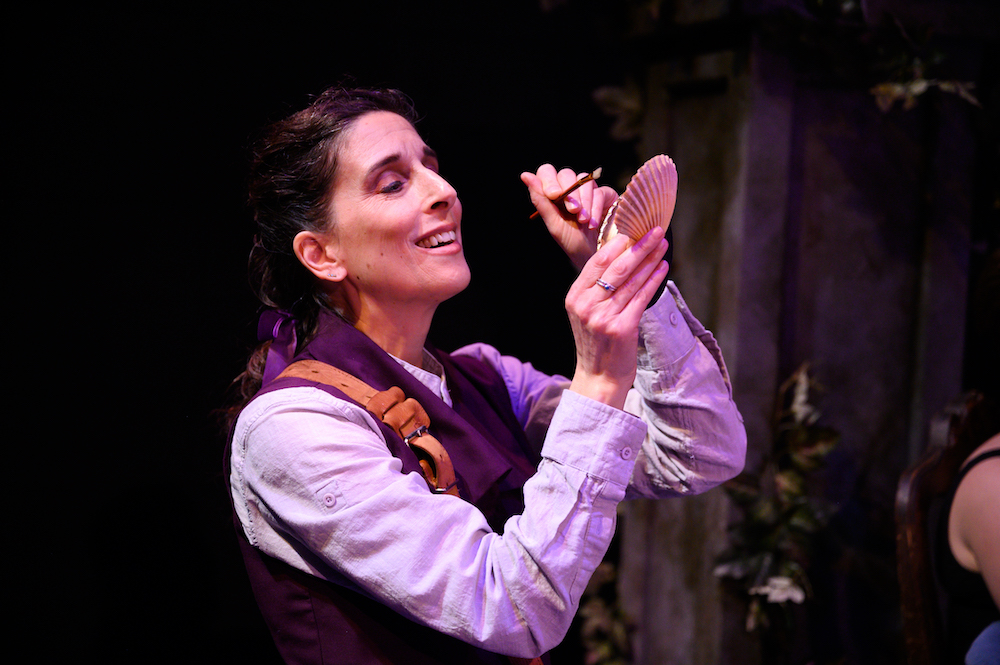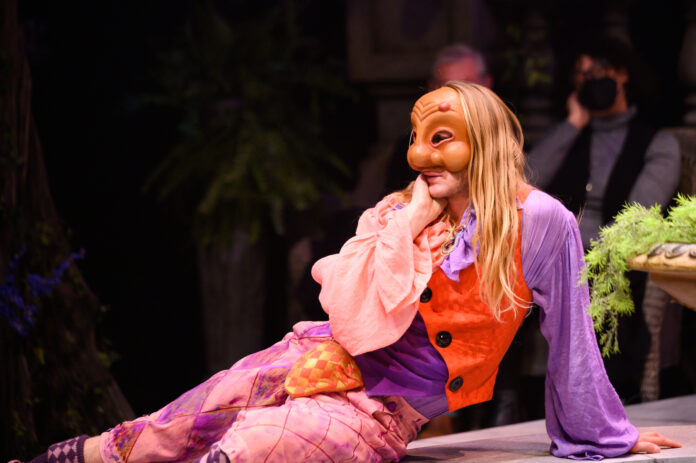It’s possible that romantic comedies age the worst of any other genre. Sure, horror may often be of-the-time, but it can easily be recycled through a story’s parallels with later horrors. Historical dramas are rife with bias, but later versions will (hopefully) use newly-acquired research to give a clearer perspective to past events. Rom-coms are different: comedy may be the most subjective of genres, and traditional romances are often based around actions that are now considered crimes—and with good reason.
Pierre Carlet de Marivaux’s The Triumph of Love (newly-translated by Stephen Wadsworth, running through April 23 at the Ashby Stage, Berkeley) is one such rom-com. The 1732 French play draws clear influences from Shakespeare and Terence, but it’s not hard to gather why this work isn’t as reproduced as often as its predecessors. It bears the hallmarks—drag, mistaken identity, convoluted circumstances that are conveniently wrapped up by the final curtain—but it lacks the charm of the earlier stories.

Said story follows Spartan princess Léonide (Veronica Renner). She knows her royal station was won by her father in a show of force, so she—in a move so morally upright that no real royal would ever do it—plans to abdicate and turn power over to the rightful prince, Agis (Edward Im). For reasons known only to her and God, Léonide figures the best way to execute her plan is to dress as a guy named Phocion and trick members of Agis’ house into falling in love with him/her. Reluctantly tagging along for the ride are Léonide’s servant Corine (Susannah Martin) and a Harlequin (Jamin Jollo) who overhears their plan. And, of course, there are siblings/Agis-acquaintances Hemocrates (David Boyll) and Léontine (Mary Ann Rodgers), both objects of Léonide’s silly seduction.
One tries their best to like this show. It being my first in-person Shotgun production since last year’s Man of God, I was hoping for generous portions of the magic that director/Shotgun AD Patrick Dooley has often brought to company productions like his Stoppard shows. Things certainly look promising with Malcolm Rodgers’ set once again employing Shotgun’s de facto “in the round” technique of seating audience members on stage. The stone-fountained courtyard that serves as our setting is stunningly detailed and very much a place one would love to spend hours alone with nothing but the sky above.
In fact, the show proper begins on a fantastic note, as Léonide and Agis have a sort of “ballet” around the fountain. It’s quiet, romantic, and immediately makes us fall in love with the two the way they appear to be falling in love with one another.

Unfortunately, the inherent flaws of the script are amplified by some odd production choices. For starters, everyone in the cast seems to have been instructed to mimic the classical theatre trope of only playing their character one-note, devoid of any nuance or depth. Renner, in particular, seems to have been instructed to play Léonide with a Mr. Burns-level of malice that seems to match Im’s Smithers-like timidness for Agis. The best one can say about the two is that they fare better than Jollo’s Harlequin, whose loud recitation quickly becomes grating and whose pursuit of Corine is creepy (but de Marivaux writes it as romantic).
The two performances that genuinely do work are Boyll and Rodgers as the pretentious siblings. Like all classical authors, de Marivaux fancied himself a poet, and Boyll and Rodgers are the only two in the cast that tap into that poetry. They successfully bring out the proverbial music of the work and imbue their otherwise-terrible characters with depth. It’s genuinely captivating to watch Boyll as he easily sees through Léonide’s subterfuge, just as it’s equally interesting to watch Rodgers personify Léontine’s succumbence to feelings of romance.
Had these sort of emotional ebbs and flows been evident in the entire ensemble (which also includes Wayne Wong as gardener Dimas), then it would have made for one of the better casts I’ve seen so far this year. Alas, we’re saddled with not-as-funny-as-they-think-they-are riffs (including one intermission) that go on for far too longa problem also apparent in last season’s production of Passing Strange.

I saw the show in person during the first-of-two masked matinees. Overall, masks were adhered to. CO² levels on my Aranet4 peaked at 2227ppm at the start of the second matinee. There were some empty seats, but I’m not sure if that was by design or just matinee numbers?
In a theatre world so eager to remount Kit Marlowe’s entire oeuvre, it’s intriguing to see a lesser-known author like de Marivaux have their work highlighted. That doesn’t mean that the work in question is good. I’m not familiar with the author’s other plays, so I can’t say how this compares to the rest, but this alone doesn’t speak well of his scripts. It’s always nice to be back in the Ashby Stage, but an outdated text an apparent direction for everyone to act at “11” made this one a tough sit.
THE TRIUMPH OF LOVE runs through April 23. Ashby Stage, Berkeley. Tickets and more info here.





